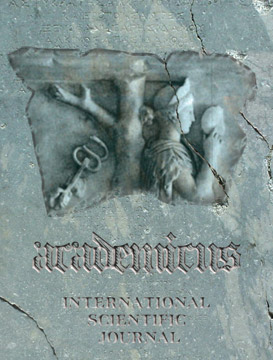Title:
When the biology, pedagogy and teaching standards come together
Full Reference List:
| 1. | Les déboires de la notion de pédagogie. Avanzini, G. 1997, Revue française de pédagogie, fv. 120, 17-24. |
| 2. | Integrated biology and undergraduate science education: a new biology education for the twenty-first century? Labov J. B., Reid A. H., Yamamoto K. R. 2010, CBE Life Sci. Educ, fv. 9:10–16. |
| 3. | Problem-based learning for traditional and interdisciplinary classroom. Stepien W., Gallagher S., Workman D. 1993, J. Educ. Gifted., fv. 16:338–357. |
| 4. | Evolving strategies for the incorporation of bioinformatics within the undergraduate cell biology curriculum. Bank J. 2003, Cell Biol. Educ., fv. 2:233– 247. |
| 5. | Transforming Undergraduate Education for Future Research Biologists. National Research Council. Washington, D.C. 2003, National Academies Press. |
| 6. | Association, American Statistical. Guidelines for the Assessment and Instruction in Statistics Education (GAISE) Project. s.l. : American Statistical Association, 2005. |
| 7. | The Nature and Sharing of Teacher Knowledge of Technology in a Student Teacher/Mentor Teacher Pair. Margerum-Leys, Jon. 2012, Journal of teacher education, fv. 46-56. |
| 8. | The Mentor Teacher as Leader: The Motives, Characteristics and Needs of Seventy-Three Experienced Teachers Who Seek a New Leadership Role. Zeichner, Ken. 2005, Teaching and Teacher Education, fv. 117–124. |
| 9. | The development of preservice chemistry teachers’ pedagogical content knowledge. Jan H. Van Driel, Onno De Jong, Nico Verloop. 2005, Science Teacher Education, fv. 572–590. |
| 10. | Does teaching experience matter? Examining biology teachers’ prior knowledge for teaching in an alternative certification program. Patricia J. Friedrichsen, Sandra K. Abell, Enrique M. Pareja, Patrick L. Brown, Deanna M. Lankford, Mark J. Volkmann. 2009, |
| 11. | Mentoring New Teachers: Implications for Leadership Practice in an Urban School. Tillman, Linda C. 2005, Educational Administration Quarterly, fv. 609- 629. |
| 12. | Analyse des perceptions du soutien d’un enseignant associé à la formation du stagiaire. Portelance, Liliane. 2010, Éducation et francophonie, fv. 21-38. |
| 13. | Contribution critique au développement des programmes d’études : compétences, constructivisme et interdisciplinarité. Philippe Jonnaert, Johanne Barrette, Samira Boufrahi et Domenico Masciotra. 2004, Revue des sciences de l’éducation, fv. 667-696. |
| 14. | Pédagogie et méthodes pédagogiques dans l’enseignement supérieur. Bireaud, A. 1990, Revue française de pédagogie, fv. 13-23. |
| 15. | Les compétences professionnelles des enseignants : étude d’un référentiel officiel et conséquences pour l’étude des pratiques enseignantes. Rey, Bernard. 2012, Phronesis, fv. 84-95. |
| 16. | Teacher Education in Light of a Few Principles, Theories, and Studies on Vocational Training and Adult Education. Mayen, Patrick. 2011, McGill Journal of Education, fv. 157-170. |
| 17. | A View of Professional Learning Communities Through Three Frames: Leadership, organization, and culture. Schunk, Carol A. Mullen et Dale H. 2010, McGill Journal of Education, fv. 185-203. |
| 18. | Facteurs déterminant l’application de nouvelles tâches d’enseignement dans le secondaire supérieur. Vos, Ndella Sylla et Louis De. 2006, Revue des sciences de l’éducation, fv. 377-394. |
| 19. | Points de vue d’enseignants de sciences au premier cycle du secondaire sur les manuels scolaires dans le contexte de l’implantation des nouveaux programmes au Québec. Abdelkrim Hasni, Christine Moresoli, Ghislain Samson et Marie-Ève Owen. 2009, Revue des |
| 20. | La sémiotique postmoderne dans la pédagogie et la recherche interculturelles. Studies, International Journal of Canadian. 2012, Roger Parent et Peeter Torop, fv. 353-379. |
Back to article
Academicus
International Scientific Journal
pISSN 2079-3715
eISSN 2309-1088
Address:
Sheshi i Flamurit, Rruga Muze
Al-9401 Vlorë, Albania
Tel: +355 68 60 60 555
info@academicus.edu.al
https://academicus.edu.al


